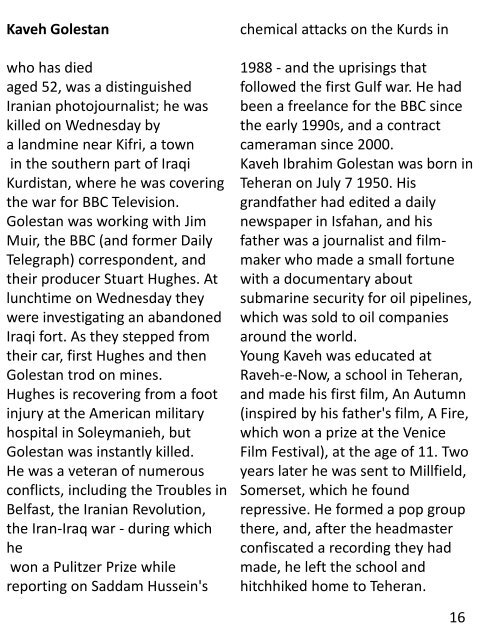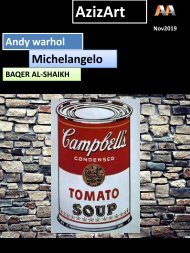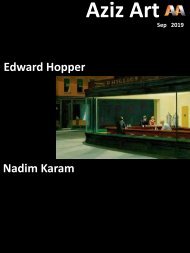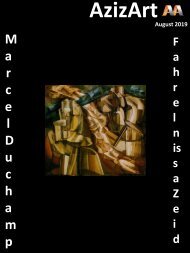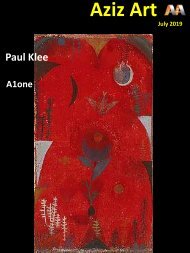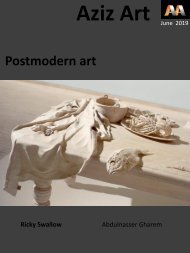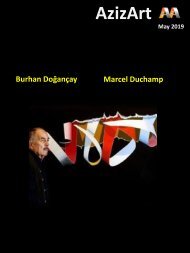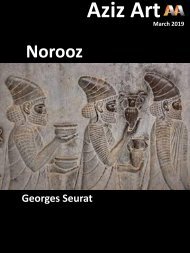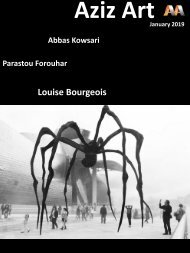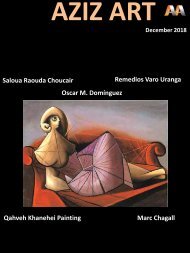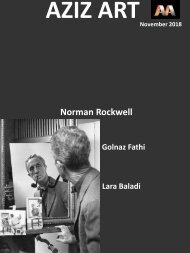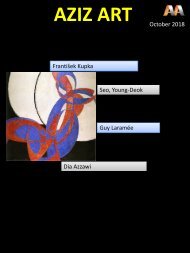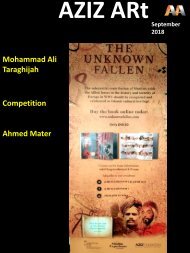Aziz Art January 2017
History of art(West and Middle East )- contemporary art#jackson pollock#Hazem Harb#lili golestan#kaveh golestan
History of art(West and Middle East )- contemporary art#jackson pollock#Hazem Harb#lili golestan#kaveh golestan
Create successful ePaper yourself
Turn your PDF publications into a flip-book with our unique Google optimized e-Paper software.
Kaveh Golestan<br />
who has died<br />
aged 52, was a distinguished<br />
Iranian photojournalist; he was<br />
killed on Wednesday by<br />
a landmine near Kifri, a town<br />
in the southern part of Iraqi<br />
Kurdistan, where he was covering<br />
the war for BBC Television.<br />
Golestan was working with Jim<br />
Muir, the BBC (and former Daily<br />
Telegraph) correspondent, and<br />
their producer Stuart Hughes. At<br />
lunchtime on Wednesday they<br />
were investigating an abandoned<br />
Iraqi fort. As they stepped from<br />
their car, first Hughes and then<br />
Golestan trod on mines.<br />
Hughes is recovering from a foot<br />
injury at the American military<br />
hospital in Soleymanieh, but<br />
Golestan was instantly killed.<br />
He was a veteran of numerous<br />
conflicts, including the Troubles in<br />
Belfast, the Iranian Revolution,<br />
the Iran-Iraq war - during which<br />
he<br />
won a Pulitzer Prize while<br />
reporting on Saddam Hussein's<br />
chemical attacks on the Kurds in<br />
1988 - and the uprisings that<br />
followed the first Gulf war. He had<br />
been a freelance for the BBC since<br />
the early 1990s, and a contract<br />
cameraman since 2000.<br />
Kaveh Ibrahim Golestan was born in<br />
Teheran on July 7 1950. His<br />
grandfather had edited a daily<br />
newspaper in Isfahan, and his<br />
father was a journalist and filmmaker<br />
who made a small fortune<br />
with a documentary about<br />
submarine security for oil pipelines,<br />
which was sold to oil companies<br />
around the world.<br />
Young Kaveh was educated at<br />
Raveh-e-Now, a school in Teheran,<br />
and made his first film, An Autumn<br />
(inspired by his father's film, A Fire,<br />
which won a prize at the Venice<br />
Film Festival), at the age of 11. Two<br />
years later he was sent to Millfield,<br />
Somerset, which he found<br />
repressive. He formed a pop group<br />
there, and, after the headmaster<br />
confiscated a recording they had<br />
made, he left the school and<br />
hitchhiked home to Teheran.<br />
16


